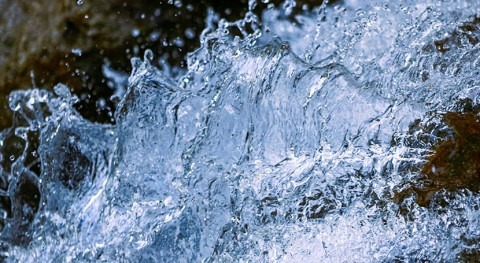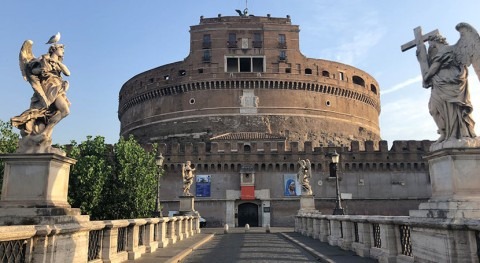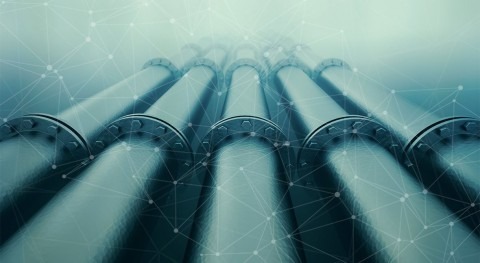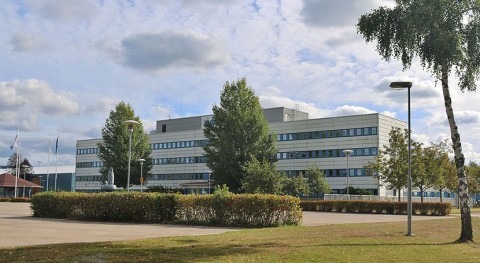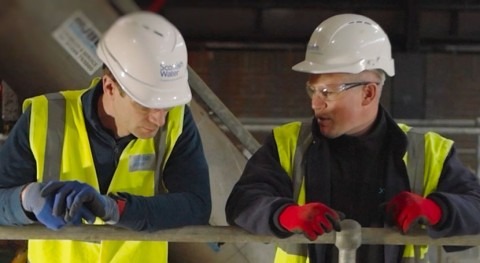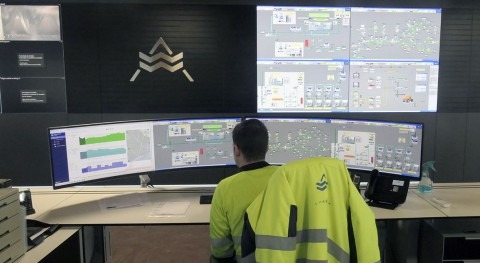Having graduated with a degree in Electronic & Information Engineering, and later obtaining an MBA in management studies, Ian Sykes, Regional Director at Sensus, has always had a keen interest in how things and people work.
Ten years ago, Sykes moved into the smart metering sector and after working in Siemens for approximately four years in a number of project and product manager roles, he took a more commercial role with Sensus.
U.S.-based Sensus is an expert in water metering solutions and a precursor to smart water networks in the Middle East. We speak to Ian Sykes to learn if technology can be the answer to some of the most critical water challenges.
Question: What do you think are the biggest challenges facing the water sector today?
Answer: Communities around the world are facing a growing storm. Complex challenges including water scarcity, changing demographics, extreme weather patterns, and aging or overly stressed infrastructure are colliding to threaten critical water, energy, transport, enterprise and health networks. The water industry is in the eye of the storm.
By 2025, more than 1.8 billion people worldwide will be living in areas of water scarcity, where more than two thirds of the world’s population will face water-stressed conditions. By 2050, it is expected that water demand will increase by 55 percent compared to 2015 levels.
The water industry is in the eye of the storm
With aging utility infrastructures as well as inaccurate and inefficient utilisation and resource management, the main two challenges, in my opinion, that need to be addressed to ensure better utilisation of our resources are: (a) gathering accurate data and (b) getting that data in a highly timely manner.
The more accurate the data, the more precise the analysis of the network and the ability of the network to determine how much water is being lost due to leakages or any other reason that may present itself. In the similar vein, accurate data is not of much use if not received in good time. Real-time data and intelligence are key to effectively monitor water consumption behaviours or discrepancies and fix the issue well in time ensuring more water is not wasted.
Q: And more specifically in the Middle East?
A: The Middle East, perhaps more so than any other region in the world faces unique water challenges, again water scarcity being one of the most pressing ones. To add to this, aging infrastructure could pose a bigger issue with water leaks in a network accounting for huge water losses. We are seeing that the region and specially in the UAE, DEWA, are on the right track in addressing these issues whilst placing sustainability front and centre of the many goals set by the governments here.
We have just launched our latest product Cordonel at WETEX. An extremely versatile metering system, Cordonel helps users manage distribution networks more efficiently, thereby contributing to better water resource management, through accurate and reliable data. Cordonel is an intelligent response to two of the major challenges that utility network managers face including lack of hyper-accurate metrology to detect the smallest leaks, and the lack of a connected meter that communicates critical network data in real-time. By addressing these, it will not only help address leakage and save costs, but also enable managers here in the region to optimise daily maintenance to increase the uptime of the network.
Cordonel is an intelligent response to two of the major challenges that utility network managers face
Q: How do you think smart water can contribute to facing these challenges?
A: The challenges facing water managers are significant and mounting, from soaring non-revenue water rates, to the prevalence of contaminants and rising energy costs. Smart water solutions hold the potential to address these challenges and fundamentally shift the economics of water management. Smart water solutions can deliver many benefits to water utilities which include:
Safety: Increased safety and control throughout water and wastewater operations.
Operational costs: Reduced energy and maintenance costs throughout the distribution network.
Resilience: Identify, predict and prevent failures and downtime in critical equipment.
Flexibility: Increased flexibility to handle different situations (e.g. volumes, parameters) with existing infrastructure.
Data is the most important factor in addressing effective consumption, distribution and preservation of water and a smart water network enables utilities to make decisions based on in-depth data collected using advanced analytics.
Q: To make the most of smart water, is it necessary to also change the way water utilities manage their infrastructure?
A: Amid growing pressure to do more with less, utilities are expected to invest $14 billion in smart water technologies through 2024 globally. Water managers are now using smart water solutions to reduce energy consumption, mitigate unnecessary water losses and optimize advanced asset management.
From too few meters in the network or degradation of meter accuracy to unauthorized use from illegal connections, utilities are facing a myriad of challenges when it comes to reducing non-revenue water (NRW) loss levels.
Another factor affecting utilities of all sizes in the war against NRW is customer side leakage. This, unfortunately is an aspect that can sometimes be forgotten about. However, through the implementation of smart water network strategy and advanced metering technology, smart water networks can reduce the amount of money spent on producing/desalinating water as well as consumption of energy required to pump water and treat wastewater.
By adopting a holistic smart approach to water management and revamping the existing infrastructure to become more water smart, utilities can bring many complementary technologies together. The right analytics can then transform compiled data into usable information leading to cost savings.
Utilities are expected to invest $14 billion in smart water technologies through 2024 globally
Q: What are the keys to success for water utilities wanting to embrace new digital solutions?
A: From our research, we’ve seen that the key to success is understanding where utilities stand today in their digital journey. The following are four of the most important elements to be incorporated in this journey.
- Putting digital strategy at the heart of the business - Since digital transformation requires organisation-wide changes in operations and strategy, putting the digital water journey at the core of the business and ensuring buy-in at boardroom level must therefore be the first priority for utilities.
- Empowering a Culture of Innovation - Human capital is one of the most important links in the water utility supply chain and our people are our greatest asset. Central to futureproofing for success is to create a culture of innovation and possibilities.
- Creating a holistic digital roadmap - The road to digital transformation is long and complex, however by implementing a strong and holistic roadmap and a clear business strategy before embarking on the digital water journey, you create a clear foundation for success.
- Developing architecture to optimise data use - Data is the most valuable asset we own; it offers instant, actionable insight to deliver truly revolutionary innovations for utilities. Converting this intelligence and optimising business processes is fundamental to the effective digitalisation of a utility infrastructure.
With UAE’s National Innovation Strategy - aim of making the UAE one of the most innovative nations in the world in the coming years as well as Smart Dubai 2021 - aiming to move to a 100 per cent digital future, adopting smart water technologies within utilities, in my opinion, will help bring the nation closer towards achieving these goals.
Q: What are the risks and challenges of adopting technologies such as AI, Big Data, etc?
A: We are seeing that the widespread adoption of AI and Big Data still faces some barriers, despite its proven benefits for the companies that have effectively implemented the technology. It’s important to remember that AI is still very much in its infancy in the region – and one of the main challenges can be linked to the resistance of change, as well as a rooted scepticism about whether or not AI can actually deliver tangible results.
In my opinion, utilities must incorporate AI in their approach to data management from the top down. Simply adding new technology to the pre-existing technology won’t go a long way. Networks that prioritise the implementation of an intelligent infrastructure that facilitates drawing and using insights from the data to evolve and adapt their technology over time will retain their competitive advantage in the long-term.
The development of consortia across municipalities to generate consolidated orders is growing and encouraged for smart metering installation
Q: What do you think is the future of smart water technology?
Across the world, governments and utilities are focussed on making the shift from outdated utility infrastructures towards Smart Utilities. More and more utility companies are realising that improved digital water capabilities hold the answer to accurate and efficient utilisation and resource management.
The good news is that the adoption of smart water solutions has already begun, and the global evolution continues apace. Utilities are expected to spend $14 billion in investment in these technologies through 2024 as water managers continue to recognize how smart water solutions reduce energy consumption, mitigate unnecessary water losses and minimize the consumption of resources. Although the cost of smart water has historically been a barrier in some regions, equipment cost is now at a point where water utilities are leveraging bulk orders to more quickly adopt these solutions and derive value in their operations. The development of consortia across municipalities to generate consolidated orders is growing and encouraged for smart metering installation. Approximately 260 smart water projects globally were announced in 2017, some in response to water scarcity situations, others driven by the need for operational efficiencies.
Let’s build on this momentum and accelerate the water industry’s migration to a smart, resource-efficient future. Let’s embrace the smart technology opportunity. Let’s solve water.




